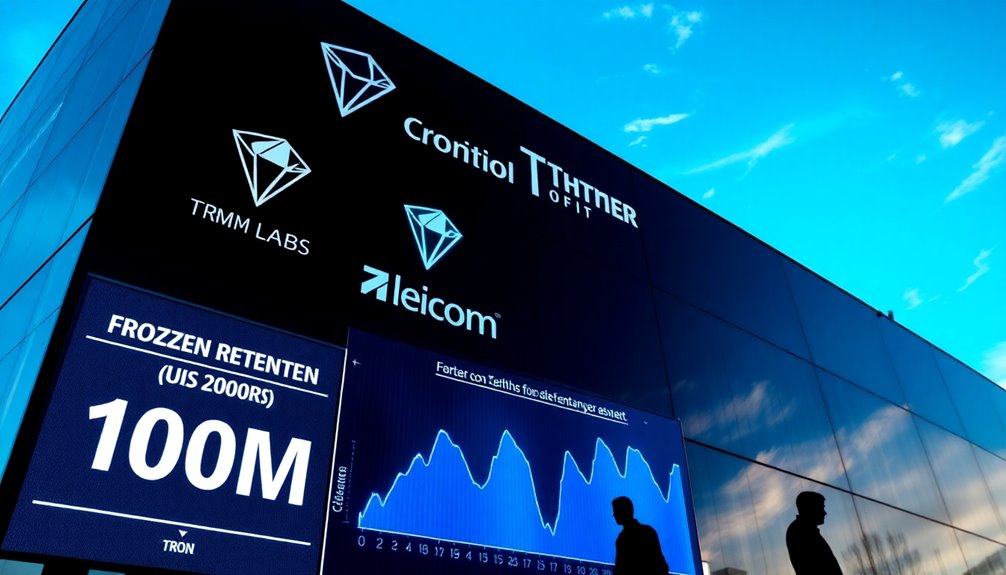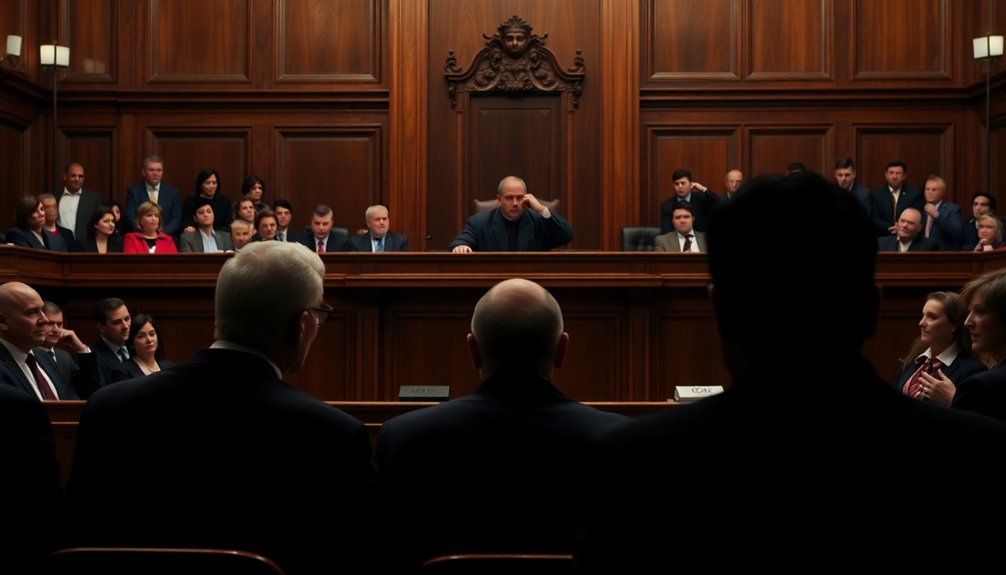Crypto News
PBOC Report Highlights Crypto Oversight, Hong Kong Takes the Lead With Licensing Initiatives
With China’s strict crypto regulations and Hong Kong’s innovative licensing, the future of virtual assets remains uncertain—what might this mean for global investments?

The PBOC's recent report emphasizes China's strict crypto regulations while highlighting Hong Kong's innovative licensing initiatives. Despite China's outright ban on cryptocurrency trading, Hong Kong's framework encourages the growth of virtual asset service providers. By requiring compliance with rigorous KYC/AML standards, the Hong Kong Securities and Futures Commission ensures a safe environment for investors. This proactive approach positions Hong Kong as a leader in crypto oversight and market growth. As regulations evolve, the crypto landscape continues to shift, revealing more about the future of this dynamic sector and how it affects global investments.
Key Takeaways
- The PBOC's report emphasizes China's strict ban on cryptocurrency trading to maintain economic stability and prevent financial risks.
- Hong Kong has established a licensing framework for virtual asset service providers, enhancing regulatory oversight and consumer protection.
- The Securities and Futures Commission in Hong Kong enforces KYC/AML compliance with significant penalties for non-compliance, fostering a secure crypto environment.
- Hong Kong's expedited licensing process has attracted nearly 30 applications this year, indicating a proactive approach to crypto market growth.
- Global regulatory comparisons highlight Hong Kong's leading role amidst varied international frameworks, striving for clarity and investor confidence in the crypto sector.
Overview of PBOC's Report

Examining the recent report from the People's Bank of China (PBOC) reveals a comprehensive analysis of the current state of cryptocurrency regulation. Published as part of the China Financial Stability Report 2024, this document takes a global perspective, discussing regulatory shifts and developments in the cryptocurrency market.
You'll find that the PBOC report highlights significant price increases in cryptocurrencies during 2023, a rebound following the crises of 2022. It notes that increasing regulations worldwide are driving heightened interest among investors.
However, the report also emphasizes the volatility and risks tied to cryptocurrency investments, reminding you that regulatory changes play a crucial role in shaping market dynamics. Furthermore, the report draws attention to Hong Kong's unique dual license system for digital asset exchanges as a significant regulatory development.
Additionally, the PBOC compares regulatory frameworks across countries, including the US, Europe, and Hong Kong. By addressing various international approaches, the report underscores the need for cohesive regulation in tackling the challenges posed by cryptocurrencies.
The insights from the PBOC provide a foundational understanding of the regulatory landscape, preparing you for a deeper exploration of China's specific stance on cryptocurrencies in subsequent discussions.
China's Stance on Cryptocurrencies

While many countries are exploring the potential of cryptocurrencies, China has taken a firm stance by implementing a strict ban on their trading and use since September 2021. This ban includes prohibitions on cryptocurrency exchanges and token financing platforms, preventing any exchange between legal currency and tokens.
Financial institutions, including non-bank payment services, can't provide any support for token issuance or cryptocurrency transactions. Even insurance businesses are restricted from covering cryptocurrencies within their liability scope.
The government's concerns center on the potential destabilization of the Chinese economy and currency. They see cryptocurrencies as a threat that could replace fiat currency, disrupting financial stability. Additionally, initial coin offerings (ICOs) are classified as illegal fundraising methods that could facilitate criminal activities. As part of a broader trend, 51 countries have implemented bans on crypto assets globally, highlighting the growing regulatory caution.
To enforce these regulations, new foreign exchange rules require banks to monitor risky trades related to cryptocurrencies. The State Administration of Foreign Exchange oversees these measures to combat underground banking and cross-border gambling.
As of August 2024, there's no indication that the ban will be lifted, as China remains committed to developing its own digital currency, the e-CNY, while tightening its regulatory grip on cryptocurrencies.
Hong Kong's Licensing Framework

Hong Kong has established a comprehensive licensing framework for virtual asset service providers (VASPs) to ensure regulatory compliance and enhance financial security. To obtain a crypto license, you must declare your intent to operate in the Hong Kong market and pass a fit and proper test, which verifies your criminal record, AML/CFT history, and financial situation. You'll also need to nominate at least two responsible officers who are qualified to manage VA services. Your application must comply with the Securities and Futures Commission (SFC) procedures and include the necessary fees. You'll need to provide a detailed documentation package, including your business activity description and legal entity information. Importantly, you must maintain a local presence, which requires having at least one local director and compliance officer, along with a physical office. The regulatory frameworks introduced are enforced under the Anti-Money Laundering and Counter-Terrorist Financing Act, and failing to comply can lead to severe penalties, including fines up to HK$5,000,000 and imprisonment. Therefore, understanding and adhering to these requirements is crucial for operating legally and successfully in Hong Kong's crypto market.
Regulatory Measures in Hong Kong

The regulatory landscape for cryptocurrencies in Hong Kong is shaped by several key bodies and legislative frameworks aimed at ensuring compliance and security in the financial market.
The Securities and Futures Commission (SFC) plays a critical role by regulating securities and futures markets, including crypto interactions and enforcing KYC/AML compliance. The Legislative Council of Hong Kong approves legislation related to crypto regulations, while the Hong Kong Monetary Authority (HKMA) collaborates with the SFC on virtual asset regulatory approaches.
Key legislation, like the Anti-Money Laundering and Counter-Terrorist Financing Ordinance (AMLO), mandates Virtual Asset Service Providers (VASPs) to comply with AML and CTF regulations. Recent updates to the SFC licensing framework emphasize the importance of rigorous compliance measures for all crypto firms operating in the region.
The Securities and Futures Ordinance (SFO) outlines requirements for market participants, establishing a framework for licensing VASPs. Applicants must demonstrate they're fit and proper to engage in providing virtual asset services.
Looking ahead, initiatives like the consultative panel for licensed virtual asset trading platforms (VATPs) and anticipated regulations for stablecoins reflect Hong Kong's commitment to consumer protection and compliance with international standards.
These measures position Hong Kong as a forward-thinking regulatory environment for digital currencies.
Global Comparison of Crypto Regulations

Across the globe, countries are adopting diverse regulatory frameworks to address the complexities of cryptocurrency.
In the European Union, the Markets in Crypto-Assets Regulation (MiCA) requires companies to obtain licenses and verify wallet ownership for transactions over 1,000 euros. This comprehensive regulation aims to protect investors and combat money laundering.
Conversely, the United States has a more fragmented approach, with the SEC and CFTC overseeing the sector but no comprehensive federal law in place—state regulations vary widely. The urgency for regulation has been heightened by recent bank collapses linked to crypto activities.
Brazil has recently appointed its central bank as the crypto supervisor, legalizing cryptocurrencies and regulating exchanges to prevent fraud.
Japan, on the other hand, recognizes cryptocurrencies as legal property, requiring exchanges to register with the Financial Services Agency and comply with AML/CFT obligations.
In Asia, Hong Kong is positioning itself as a crypto hub by allowing licensed exchanges to trade digital currencies with retail investors, ensuring that financial institutions incorporate these transactions into existing frameworks.
Meanwhile, South Korea mandates that exchanges register with the Korea Financial Intelligence Unit, with strict user protection measures in place.
Each country's unique approach reflects its regulatory priorities and economic context.
Impact on the Crypto Market

With new regulations taking shape, the crypto market is poised for significant transformation. You'll likely notice an influx of new entrants as the streamlined licensing process reduces application timelines and boosts transparency. The introduction of a consultative panel will enhance regulatory clarity, allowing licensed platforms to engage directly with regulators. Tax waivers on crypto gains aim to attract global asset managers and wealthy investors, increasing market participation. As part of this effort, authorities are also working on licensing requirements for crypto custodians, ensuring that digital assets are safeguarded effectively. Furthermore, the integration of decentralized control through blockchain technology will foster a more secure environment for transactions. Additionally, the push for renewable energy sources in crypto mining operations aligns with global sustainability goals.
Investor confidence is set to rise as robust regulations emerge, reassuring traditional financial institutions and retail investors alike. The dual license system for digital asset exchanges ensures compliance and supervision, while mandatory customer monitoring by major financial institutions adds an extra layer of security. You can expect the market to grow as existing crypto businesses expand and new players join in. The allowance for exchange-traded funds (ETFs) with direct exposure to digital assets like Bitcoin and Ether will further stimulate interest.
Future Developments in Hong Kong

Hong Kong's crypto landscape is set for a dramatic shift as an expedited licensing process rolls out next year, making it easier for trading platforms to enter the market.
This streamlined approach will reduce waiting times and simplify compliance procedures, attracting more participants. However, you should expect rigorous assessments of applicants' policies and systems, all certified by a qualified public accountant. The second-phase assessment will involve collaboration between the SFC and external assessors.
Regulatory framework enhancements will also play a crucial role in shaping the market. A consultative panel for licensed platforms will ensure sustainable innovation, while a proposed stablecoin framework will focus on fiat-backed options to bolster financial stability. Furthermore, the government aims to position Hong Kong as a global crypto hub by attracting international investors.
The SFC is set to implement a dual license system for digital asset exchanges, categorizing virtual assets under securitized and non-securitized financial assets.
Moreover, Hong Kong aims to attract global asset managers with potential tax waivers on crypto gains, positioning itself as a financial hub.
With nearly 30 applications received this year and four new exchanges already licensed, the future looks promising for crypto in Hong Kong, fostering trust, transparency, and stability in the sector.
Conclusion on Crypto Oversight

The evolving landscape of crypto oversight reveals a complex interplay of regulatory frameworks and challenges that demand careful navigation.
As you consider the implications of these regulations, it's clear that a global effort is essential. The EU's MiCA framework and the US's FIT21 bill illustrate differing approaches but share the common goal of consumer protection and regulatory clarity. Notably, the implementation of strict AML/KYC regulations highlights the increasing importance of compliance in maintaining market integrity.
Countries like Türkiye are tightening their grip on crypto asset service providers, emphasizing the importance of compliance in a rapidly evolving market.
However, consumer protection remains a significant concern, as lagging rules create vulnerabilities, especially in regions with high adoption rates but underdeveloped regulations.
The fragmented regulatory environment complicates compliance, making it paramount for businesses to stay informed about overlapping jurisdictions.
Hong Kong's dual licensing system stands out as a proactive measure, setting a precedent for other jurisdictions.
Frequently Asked Questions
What Are the Penalties for Violating Crypto Regulations in China?
If you violate cryptocurrency regulations in China, you could face serious penalties. Engaging in crypto transactions might land you in prison for up to 10 years and fines reaching $79,100.
Fundraising over 100,000 yuan could also lead to severe consequences, including lengthy prison sentences. Authorities actively crack down on illegal activities, so you need to be cautious.
Financial institutions are prohibited from participating in any cryptocurrency-related services, increasing your legal risks.
How Do Crypto Regulations Affect Individual Investors in Hong Kong?
Crypto regulations in Hong Kong significantly impact you as an individual investor.
You can only trade on licensed platforms, and to access these, your portfolio must exceed HKD 8 million. You'll need training to understand cryptocurrencies and can only invest in certain products.
While you can engage in peer-to-peer trading, restrictions on foreign ETFs limit your options.
The regulatory environment aims to ensure safe practices, affecting your trading flexibility and potential profits.
Are There Tax Implications for Crypto Transactions in Hong Kong?
Yes, there are tax implications for crypto transactions in Hong Kong.
You'll need to report profits from trading as business income, while any crypto received for goods or services is subject to standard corporate or salary taxes.
Capital gains from holding crypto aren't taxed, and you won't face GST or VAT on transactions.
Remember to declare everything on your tax returns, as the Inland Revenue Department enforces compliance.
What Is the Role of International Organizations in Crypto Regulation?
International organizations play a crucial role in crypto regulation by setting high-level recommendations and standards.
They focus on creating a technology-neutral approach, ensuring that similar activities face the same regulations.
By promoting cross-border cooperation and information sharing, they help prevent regulatory arbitrage and enhance oversight.
Additionally, they advocate for robust measures to prevent financial crimes, ensuring that governance and risk management standards align with the complexities and risks of crypto activities.
How Do Regulatory Changes Impact Crypto Innovation in Hong Kong?
Regulatory changes in Hong Kong significantly impact crypto innovation by creating a structured environment for digital asset trading.
You'll see that the dual licensing system encourages compliance while promoting market growth. This clarity attracts global firms, enhancing investor confidence.
With initiatives like the stablecoin issuer sandbox, you're likely to witness new products and services emerging.
Conclusion
In conclusion, the PBOC's report underscores the importance of regulatory oversight in the crypto space, with Hong Kong setting a strong example through its licensing initiatives. As you navigate this evolving landscape, staying informed about these developments will be crucial. The proactive measures in Hong Kong could shape the future of crypto regulations globally, offering both opportunities and challenges. Embracing these changes will help you make better decisions in your crypto ventures moving forward.
Thorsten has been immersed in the cryptocurrency world for several years. His early experiences as a miner and active market participant have given him first-hand knowledge of the industry’s highs and lows. Thorsten’s approach is grounded in transparency and honesty, ensuring our editorial direction remains authentic, accurate, and reader-focused.
Crypto News
Coalition Of Tether, Tron, TRM Labs Takes Action Against Crypto Crime, Freezing Over $100M
Get insights into how the coalition of Tether, TRON, and TRM Labs is tackling crypto crime by freezing over $100 million in suspicious assets.

The coalition of Tether, TRON, and TRM Labs is taking a bold stand against crypto crime by freezing over $100 million in assets connected to illegal activities. Formed in August 2024, this innovative financial crime unit collaborates with law enforcement across five continents. Utilizing blockchain intelligence, they pinpoint transactions tied to terrorism and cybercrime. By proactively monitoring for scams and implementing compliance measures, the coalition aims to strengthen the crypto ecosystem. Their actions highlight the importance of public-private partnerships in combating financial crime, and there's much more on how this shapes the future of digital finance.
Key Takeaways
- The T3 Financial Crime Unit, formed in August 2024, targets illicit USDT usage on the TRON blockchain.
- Over $100 million in Tether's USDT has been frozen due to various illicit activities.
- The coalition employs TRM Labs' blockchain intelligence to detect terrorism and cybercrime-related transactions.
- Successful actions have led to freezing over $12 million linked to scams and illicit trades.
- The initiative emphasizes regulatory compliance, public awareness, and education within the crypto community.
Formation and Collaboration

In August 2024, the T3 Financial Crime Unit was formed to tackle the illicit use of USDT on the TRON blockchain.
This unique collaboration among Tether, TRON, and TRM Labs represents the first private sector financial crime unit aimed at addressing blockchain-related crime.
You'll find that the unit not only focuses on combating financial crime but also collaborates with law enforcement agencies across five continents.
By sharing intelligence and simplifying cross-border cooperation, they enhance the effectiveness of investigations into illegal activities. Notably, the unit has already successfully frozen over $100 million in Tether's USDT linked to illicit activities.
Each member brings vital expertise: TRON supports the network, Tether contributes to investigations, and TRM Labs provides advanced analytics.
Together, they're committed to maintaining the integrity of the financial ecosystem while disrupting criminal operations.
Scope of Operations

The scope of operations for the T3 Financial Crime Unit is extensive and multifaceted, designed to combat a wide range of illicit activities in the cryptocurrency space.
You'll see them utilizing blockchain intelligence from TRM Labs to detect transactions linked to crimes like terrorism and cybercrime. Their global network of expert investigators generates vital intelligence, supporting law enforcement in real-time. Additionally, the unit has successfully frozen over USDT $12 million linked to various scams, underscoring its commitment to disrupting criminal operations.
They implement transaction monitoring tools to swiftly address high-priority incidents and employ advanced data analysis to trace fund flows.
By collaborating with law enforcement globally, they share critical information and engage in joint investigations.
They also focus on regulatory compliance, public awareness, and education, ensuring that both the crypto community and authorities are equipped to tackle emerging threats effectively.
Frozen Assets Overview

Understanding frozen assets is key when examining the broader landscape of cryptocurrency-related crimes. Frozen crypto represents a temporary suspension of access to specific funds, often due to legal issues, security concerns, or compliance matters. During this freeze, the associated private keys or smart contracts are locked, preventing any transactions until the freeze is lifted.
Common reasons for freezing assets include ongoing investigations into fraud or money laundering, security breaches to protect user funds, and compliance with regulations. Centralized platforms can enforce these freezes, sometimes requiring a court order. Additionally, certain tokens possess features that allow developers to implement freezes or blacklist specific addresses, ensuring greater security and regulatory adherence in the crypto space. This approach highlights the importance of frozen crypto as a mechanism for maintaining order within the evolving digital financial ecosystem.
Types of Financial Crimes

As financial crimes evolve, they increasingly exploit the unique features of cryptocurrency, making it essential to recognize the various types that pose significant risks.
Money laundering often employs crypto mixers and decentralized finance (DeFi) platforms to hide transaction origins, with daily average theft from DeFi protocols exceeding $7.6 million(daily average theft from DeFi protocols).
Cybercrime, particularly ransomware attacks, demands payments in crypto, allowing hackers to target critical infrastructure.
Consumer scams, like Ponzi schemes and fake exchanges, use social engineering to lure victims into losing billions.
Additionally, darknet marketplaces facilitate illicit trade in drugs, stolen data, and weapons, thriving on anonymous cryptocurrency transactions.
Each of these financial crimes not only endangers individual investors but also jeopardizes the integrity of the entire crypto ecosystem, highlighting the need for vigilant countermeasures.
Regulatory and Legal Context

Navigating the regulatory and legal context of cryptocurrency can feel overwhelming, especially with the rapid evolution of rules and standards across the globe.
You'll notice a global framework emphasizing 'same activity, same risk, same regulation,' targeting crypto-assets and stablecoins while excluding CBDCs. FSB's framework aims for consistent and comprehensive regulation to address the vulnerabilities highlighted in the past year.
Various regulatory bodies play distinct roles; the SEC protects investors, the CFTC tackles fraud in derivatives, and the DoJ focuses on criminal activities.
The U.S. and EU are actively working to streamline regulations, like the Markets in Crypto-assets Regulation (MiCA).
Additionally, specific measures, including anti-money laundering laws and IT security requirements, aim to enhance market integrity and consumer protections.
Impact of the Coalition

How has the Coalition Against Crypto Crime reshaped the landscape of digital asset security?
The Coalition's swift action in freezing over $100 million in USDT assets showcases its effectiveness in combating criminal activity. Its international reach, spanning five continents, highlights the importance of global cooperation in tackling money laundering, investment fraud, and other serious crimes. The Coalition's efforts align with the growing recognition that complex schemes used in cryptocurrency laundering necessitate innovative solutions.
By analyzing millions of transactions in real-time, the Coalition disrupts criminal operations and sends a strong deterrent message. Furthermore, its collaboration with law enforcement enhances security and transparency, setting new standards in the crypto space.
The proactive monitoring and continuous engagement with authorities not only bolster the integrity of the financial ecosystem but also demonstrate the transformative power of public-private partnerships in ensuring a safer crypto environment.
Future Directions in Crypto Security

The advancements in digital asset security are paving the way for a more resilient future, building on the foundation laid by the Coalition Against Crypto Crime. You'll see post-quantum cryptography emerging to defend against quantum computing threats, ensuring your assets remain secure. Advanced encryption methods like homomorphic encryption allow computations on encrypted data, preserving privacy without compromising security. The implementation of robust cryptographic algorithms will be essential in countering emerging threats and maintaining the integrity of digital transactions. Additionally, AI security solutions will enhance threat detection and automate incident responses, keeping you a step ahead of cyber threats. Furthermore, decentralized security protocols will reduce single points of failure, bolstering overall network resilience.
Importance of Public-Private Partnerships

Public-private partnerships play a crucial role in combating financial crimes, especially in the rapidly evolving landscape of crypto assets. By facilitating information sharing, these collaborations enhance understanding of financial crimes and improve investigations. You'll see how combining transactional data with law enforcement intelligence leads to better identification and prevention of illicit activities. This proactive approach enables early detection of threats, allowing targeted interventions for high-risk transactions. Furthermore, these partnerships support the development of effective regulatory frameworks that enhance compliance with AML/CFT regulations. Ultimately, they foster innovation, build trust among stakeholders, and contribute to a global impact, promoting transparency and good governance in financial systems. Formal Partnerships are essential for strategic intelligence sharing and addressing complex financial crime challenges. Together, these efforts create a more secure environment for everyone involved in the crypto space.
Frequently Asked Questions
How Can Individuals Report Suspected Crypto-Related Crimes?
If you suspect crypto-related crimes, you can report them to the FBI's Internet Crime Complaint Center (IC3) or the Federal Trade Commission (FTC).
Gather essential details like cryptocurrency addresses, transaction hashes, and any communication with the scammer.
Local law enforcement agencies and Chainabuse.com are also good options.
After filing your complaint, keep a record of it and be cautious of recovery services that ask for upfront fees.
What Measures Protect User Privacy During Investigations?
During investigations, various measures can protect your privacy. Techniques like ring signatures and stealth addresses obscure sender identities and transaction amounts.
Tools such as Wasabi and Samourai wallets enhance anonymity by mixing transactions. Using VPNs and Tor can hide your IP address during online activities.
While regulatory compliance pressures exist, innovations like zero-knowledge proofs help maintain your privacy while still allowing for transaction verification, striking a balance between personal security and transparency.
How Does This Coalition Affect Legitimate Cryptocurrency Users?
This coalition enhances the security of the cryptocurrency environment, ultimately benefiting you as a legitimate user.
By targeting illicit activities, it promotes a safer space for transactions, boosting your trust in the system. You'll likely see improved transparency, making it easier to trace funds.
However, be aware that some temporary account freezes might occur, which could affect your access if flagged erroneously.
Are There Penalties for Crypto Exchanges That Don't Comply?
Yes, there are significant penalties for crypto exchanges that don't comply with regulations. You might see steep fines, as seen with Binance, which agreed to pay billions for violations.
Criminal liability can also arise, leading to serious consequences for executives. Additionally, exchanges may face restrictions on operations, mandated monitoring, and even the shutdown of their platforms.
It's crucial for exchanges to adhere to regulations to avoid these harsh penalties and maintain user trust.
What Technologies Are Used to Analyze Blockchain Transactions?
To analyze blockchain transactions, you'll use a variety of technologies.
Blockchain explorers and APIs enable you to extract raw data from networks. Once collected, you clean and structure this data using parsing techniques.
Machine learning algorithms help assess transaction risks and visualize trends. You can apply address clustering to group entities and use advanced visualization tools to detect suspicious patterns and flows, making complex data comprehensible and actionable for investigations.
Conclusion
In conclusion, the coalition of Tether, Tron, and TRM Labs is making significant strides in combating crypto crime by freezing over $100 million in assets. This collaborative effort highlights the importance of addressing financial crimes in the evolving digital landscape. As they continue to strengthen public-private partnerships, you can expect more robust security measures and regulatory frameworks to emerge. Together, we can foster a safer environment for everyone involved in the cryptocurrency ecosystem.
Thorsten has been immersed in the cryptocurrency world for several years. His early experiences as a miner and active market participant have given him first-hand knowledge of the industry’s highs and lows. Thorsten’s approach is grounded in transparency and honesty, ensuring our editorial direction remains authentic, accurate, and reader-focused.
Crypto News
Celsius Fights Back: Appeals Court Ruling Against $444M Claim on FTX Transfers
How will Celsius’s appeal against the $444 million ruling impact the future of creditor claims in the crypto industry? Discover the potential ramifications.

Celsius is fighting back after an appeals court dismissed its $444 million claim against FTX, citing procedural flaws. The judge found that Celsius filed an amended claim after the July 2024 bar date without proper approval, making its arguments irrelevant to the original allegations. Their initial claim sought $2 billion but was reduced to focus on preferential transfers. Now, Celsius has filed a Notice of Appeal, aiming to challenge the dismissal and protect its rights. The outcome of this case could reshape how creditor claims are handled in the evolving crypto landscape. Curious about the implications?
Key Takeaways
- Celsius's appeal challenges the court's dismissal of its $444 million claim against FTX due to procedural flaws.
- The original claim sought $2 billion for damages but was later reduced to focus on preferential transfers.
- Court dismissed amended claims for being unrelated to the original allegations and filed without approval.
- Legal experts are monitoring Celsius's appeal for compliance with necessary legal standards and potential impact on creditor claims.
- The case highlights broader instability in the crypto industry following the FTX collapse, leading to increased regulatory scrutiny.
Overview of the Court Ruling

Recently, the court ruled against Celsius in a significant case involving FTX transfers.
Judge John Dorsey dismissed both the initial and amended claims due to procedural flaws. The amended claim was filed after the July 2024 bar date without court approval, and its content didn't relate to the original claims.
The judge noted that allowing these claims could obstruct FTX's restructuring plans. Additionally, the court found that Celsius failed to provide sufficient evidence to support its allegations, particularly regarding "preferential transfers." This dismissal reflects the judge's emphasis on the potential obstruction of FTX's restructuring efforts.
The lack of detail in the claims was a critical factor in the dismissal. Celsius now faces the challenge of appealing this ruling while pursuing its goal of recovering funds for its creditors.
Details of the Original Claim

The original claim filed by Celsius sought an astonishing $2 billion in damages from FTX, based on allegations that FTX officials made "unsubstantiated and disparaging statements."
These statements purportedly harmed Celsius' reputation and contributed to its financial collapse in 2022. Celsius argued that FTX officers made false claims about its balance sheet and financial stability, which undermined investor confidence and the company's ability to operate.
The basis of the claim focused on reputational harm and the systemic damage these statements caused to Celsius' business. Eventually, the claim amount was reduced to $444 million, shifting the focus to "preferential transfers," but the initial allegations set the stage for the ongoing legal battle between Celsius and FTX. Additionally, the original proof of claim was deemed insufficient by the court, contributing to the dismissal of Celsius's claims.
Procedural Issues Highlighted

Numerous procedural issues have emerged during Celsius's legal battle against FTX, complicating their claims and weakening their position.
The initial filings lacked sufficient detail to support allegations of preferential transfers, with claims only briefly mentioning potential preferences without adequate evidence. The court deemed these claims too vague to proceed.
When Celsius filed amended claims after the deadline, they introduced new arguments unrelated to the original claims, failing to justify the delay. This disrupted FTX's reorganization efforts and asset distribution efforts.
Moreover, Celsius didn't seek court approval for these late amendments, rendering them procedurally improper. The court emphasized that such procedural deficiencies couldn't be overlooked, significantly undermining Celsius's efforts to recover the contested funds.
Appeal Process and Next Steps

Celsius has officially entered the appeal process following Judge John T. Dorsey's ruling.
On December 31, the company filed a Notice of Appeal in the District Court, signaling its intent to challenge the dismissal of its $444 million claim against FTX.
This move underscores Celsius' belief that its initial proofs of claim adequately notified FTX of the issues at hand. Legal experts will closely monitor whether these claims meet the necessary legal standards. The appeal process is crucial for Celsius to assert its rights and seek potential damages. As Celsius' claims relate to the alleged financial misconduct by FTX officers, stakeholders should stay updated, as the outcome could significantly impact creditor claims within the cryptocurrency bankruptcy landscape.
Allegations Against FTX Executives

Allegations against FTX executives reveal a troubling pattern of misconduct that has shaken the cryptocurrency industry. Misuse of customer funds is at the forefront, with billions diverted to Alameda Research for trading, luxury real estate, and political contributions. Executives designed code features that allowed Alameda to leverage customer assets, violating FTX's public claims of separation between the two entities. Additionally, FTX lacked proper governance and controls, leaving funds and sensitive data vulnerable. Notably, FTX's financial troubles became apparent when it filed for bankruptcy after failing to cover an $8 billion funding gap. Fraudulent schemes, including fake financial statements and inflated token valuations, masked severe financial issues. Sam Bankman-Fried and his associates now face serious legal repercussions, including fraud charges and potential prison time, while some executives have chosen to cooperate with authorities.
Broader Implications for Crypto

The collapse of FTX has sent shockwaves through the crypto industry, raising urgent questions about its stability and future.
You may have noticed a surge in customer withdrawals from various exchanges, reflecting a significant loss of trust across the market. While systemic financial institutions seem insulated, the fallout has led to many crypto lenders and exchanges downsizing or shutting down entirely. This situation underscores the urgent need for increased regulatory scrutiny. As cautious investors demand transparency and accountability, the industry must adapt. The incident has highlighted the importance of client deposits mismanaged, indicating that the landscape of crypto is poised for transformative changes.
Future exchanges will likely adopt stricter auditing and compliance practices to safeguard against similar failures. The incident has sparked vital discussions about client protection measures, indicating that the landscape of crypto is poised for transformative changes.
Importance of Procedural Compliance

Why is procedural compliance crucial for organizations navigating the turbulent waters of the crypto industry? It ensures you adhere to legal, regulatory, and internal standards, protecting your organization from risks like legal penalties or reputational damage.
By maintaining clear policies and training programs, you promote ethical conduct and uphold the organization's integrity. Regular audits help identify compliance issues, while well-defined roles clarify responsibilities. Regular evaluations based on evaluation criteria are essential for assessing compliance effectiveness and identifying areas for improvement. Additionally, adhering to compliance standards can enhance an organization's ability to leverage blockchain technology for operational improvements.
Compliance is also key to effective risk management, as it involves monitoring systems to address any concerns. Moreover, structured procedures enhance operational efficiency and transparency, allowing for fair treatment and systematic operations.
In a volatile industry, staying compliant isn't just important; it's essential for long-term success and sustainability.
Frequently Asked Questions
What Are the Potential Outcomes of the Appeal for Celsius?
The potential outcomes of the appeal for you could vary significantly.
If it's successful, you might recover $444 million, positively impacting your creditors and financial health.
However, if the appeal fails, you won't reclaim those funds, which could hinder your repayment efforts and affect your token's value.
Additionally, the appeal's outcome could set a precedent for future bankruptcy claims, influencing your legal strategies and those of similar companies in the crypto space.
How Will This Ruling Affect Celsius' Creditors?
This ruling could significantly impact your recovery as a Celsius creditor.
If the appeal goes against Celsius, it might delay the distribution of funds and complicate your claims process.
You may find that your eligibility for repayments changes, and the overall amount available could shrink, affecting your financial outcome.
The decisions made here will likely set a precedent that influences future claims and restructuring efforts in the cryptocurrency space, impacting your rights as a creditor.
What Is the Timeline for the Appeal Process?
The appeal process typically begins with the filing of the Notice of Appeal, which you've already seen happen.
After that, you can expect the appellant to prepare a brief outlining their arguments, usually within a few months.
The opposing party then submits their response.
Oral arguments may follow, and the court usually takes some time to deliberate before issuing a ruling.
Can Celsius File a New Claim After the Dismissal?
You can't simply file a new claim after a dismissal without addressing the reasons for the initial dismissal.
If the court found procedural flaws or insufficient evidence, you'll need to ensure your new claim resolves those issues.
You might consider gathering stronger evidence or clarifying your arguments.
Consult with your legal team to understand the best approach, as timing and compliance with court rules are crucial for any future claims.
How Does This Ruling Impact Other Cryptocurrency Companies?
This ruling sets a significant precedent for other cryptocurrency companies navigating bankruptcy.
You'll notice that it tightens the standards for filing claims, requiring clarity and timeliness to avoid dismissal.
As a result, companies in similar situations may face increased scrutiny and pressure to adhere strictly to procedural requirements.
This could lead to a more cautious approach in how they handle their financial practices, ultimately impacting their operations and relationships with creditors.
Conclusion
In conclusion, Celsius' appeal against the court ruling on the $444 million claim related to FTX transfers underscores the complexities of the crypto landscape. As they navigate the appeal process, the outcome could set significant precedents for how crypto firms handle legal claims. It's vital for all players in the industry to prioritize procedural compliance, ensuring transparency and accountability. Keep an eye on this case, as it could reshape the future of cryptocurrency litigation.
Thorsten has been immersed in the cryptocurrency world for several years. His early experiences as a miner and active market participant have given him first-hand knowledge of the industry’s highs and lows. Thorsten’s approach is grounded in transparency and honesty, ensuring our editorial direction remains authentic, accurate, and reader-focused.
Crypto News
New Crypto Feature On Telegram: What It Means For Users
Curious about Telegram’s new crypto features and how they could transform your digital currency experience? Discover what’s next for users in this evolving landscape.

Telegram's new crypto features make exploring digital currencies easier than ever for you. With seamless access to the TON blockchain, you can send, receive, and store TONcoin and USDT directly within chats. Automated trading bots analyze market data, executing trades based on your preferences without needing coding skills. Plus, you can send unique animated NFTs as gifts, adding a personal touch to your messages. As nearly one billion users engage with these tools, Telegram enhances security and convenience. Curious about how these updates might evolve further? Stick around to find out more about the future of crypto on Telegram.
Key Takeaways
- Users can easily access crypto services directly within Telegram chats, streamlining their trading and transaction experience.
- Built-in wallets allow for secure storage and instant transactions of TONcoin and USDT without additional fees.
- Automated trading bots enable users to execute trades based on real-time market data, enhancing trading efficiency without coding skills.
- NFT gifting features allow users to personalize their digital gifts, with the option to convert them into unique, verifiable NFTs.
- Enhanced security measures, including biometric protection, ensure safe transactions and foster user confidence in crypto activities.
Integration With TON Blockchain

The integration of Telegram with the TON blockchain revolutionizes how you interact with cryptocurrencies. You'll enjoy seamless access to various services right within your chats, making transactions faster and more efficient.
With built-in wallets linked to your Telegram account, you can easily receive, store, and send cryptocurrencies like TONcoin and USDT. The dynamic sharding and instant routing mechanisms enhance scalability and minimize latency, ensuring a smooth user experience. Additionally, the use of Proof of Stake helps maintain network integrity and security, further enhancing your confidence in using the platform.
Plus, you can swap money directly from your bank into crypto without incurring transaction fees. The decentralized network not only boosts security but also fosters transparency, allowing you to trust your transactions.
Crypto Trading Bots Overview

Efficiency in trading has never been more accessible with the rise of crypto trading bots. These automated tools analyze real-time and historical market data, generating trading signals based on technical indicators like RSI and MACD. Telegram crypto trading bots integrate seamlessly with messaging platforms, allowing users to execute trades effortlessly.
You can customize your risk preferences, including stop-loss and take-profit levels, ensuring your strategies align with your goals. Once set up, bots execute trades automatically via APIs, continuously monitoring market conditions to adapt as needed.
With user-friendly interfaces, you don't need any coding knowledge to get started. Whether you're interested in copy trading, scalping, or arbitrage, these bots save you time and provide real-time insights, making them a great choice for both novice and experienced traders alike.
NFT Gifting Features

Imagine brightening someone's day with a unique piece of animated digital art that carries a personal message.
With Telegram's NFT gifting feature, you can do just that! You can send these digital gifts, which can be easily converted into non-fungible tokens (NFTs) on the TON blockchain. Each gift is not only unique but also verifiably collectible, ensuring that your gesture is both special and secure. Additionally, the concept of diversification strategies in cryptocurrency can enhance the value of your digital gifts over time.
To upgrade your gift, you'll use Telegram Stars to cover the blockchain fees. Each NFT can be customized with unique designs, colors, and traits, making it one-of-a-kind.
Plus, you can showcase your NFTs on your profile or trade them for Telegram Stars. This not only adds a personal touch but also opens up monetization options through trading on various platforms.
Enjoy the creativity and security of gifting digital art like never before!
User Base Impact

With nearly 1 billion users, Telegram's vast user base has a significant impact on crypto adoption.
Over 800 million of you now have access to the platform's crypto wallet, making it easier than ever to engage with cryptocurrencies. This is especially crucial in emerging markets, where traditional banking can be limited. The integration of crypto Mini Apps directly into the messaging platform further enhances user engagement with various crypto services.
By simplifying the onboarding process and offering a user-friendly interface, Telegram encourages more people to explore crypto. You can interact with decentralized exchanges, NFT trading, and other crypto services seamlessly.
Plus, with enhanced security measures like biometric protection and verified accounts, your experience remains safe and trustworthy.
Regulatory Challenges Ahead

Navigating the complex landscape of cryptocurrency regulations can feel like wandering through a maze for Telegram and its users.
Regulatory challenges vary significantly across regions, with Europe's stricter rules slowing down crypto adoption while Asia faces unique hurdles due to rapid growth. The U.S. regulatory environment is also evolving, with increasing regulatory focus on crypto and digital asset usage presenting new compliance challenges for firms.
In low- and middle-income countries, regulatory development lags behind, creating a patchwork of uncoordinated laws that allow for regulatory arbitrage.
Compliance with financial laws like AML and KYC is essential, and the SEC's past enforcement actions show the seriousness of these requirements.
Legal disputes, such as those involving Telegram's halted TON project, highlight the complexities of engaging with regulators.
A global approach to regulation is crucial, yet achieving coordination remains a significant challenge.
Additional Features and Enhancements

Telegram's latest update brings a host of exciting features and enhancements that make it easier than ever to engage with the cryptocurrency world.
You can now buy "Telegram Stars" directly in the app or via the Fragment website, linking your TON wallet for seamless transactions. These stars can be upgraded into unique NFTs, which you can trade across compatible blockchains.
The new third-party verification helps you identify genuine accounts, reducing scams and misinformation. Plus, with emoji reactions and improved search filters, your chats become more interactive. This update includes enhanced credibility through verified profiles, which boosts user trust and safety.
Personalize your gifts with custom backgrounds before minting them as NFTs, and enjoy the added utility of Toncoin (TON) with seamless peer-to-peer transfers.
This update truly elevates your Telegram experience in the crypto space.
Future of Crypto on Telegram

The future of crypto on Telegram looks promising, as it continues to integrate innovative features that bridge the gap between messaging and digital assets.
With over 800 million users now accessing Telegram's crypto wallet, you can expect seamless transactions using TON and stablecoins like USDT. As the platform evolves, it's crucial for users to embrace digital asset management, which will enhance their ability to track and optimize their investments.
The introduction of NFT gifting and the ability to convert gifts into NFTs enhances user engagement and trading opportunities. Furthermore, the platform's new third-party verification feature aims to enhance trust and reduce misinformation, fostering a safer environment for crypto transactions.
Additionally, the @Wallet bot provides fee-free transactions, making it easier for you to manage your assets.
As Telegram supports large crypto communities and real-time market updates, it's set to drive mainstream blockchain adoption. With ongoing development and anticipated new applications, Telegram could become a leading platform for crypto transactions and interactions.
Frequently Asked Questions
How Do I Set up a Crypto Wallet on Telegram?
To set up a crypto wallet on Telegram, start by downloading the app and creating an account if you haven't already.
Make sure your app's updated.
Search for the 'Wallet' option in the chat bar, then begin a conversation with the Telegram Wallet bot.
Click 'Start' and follow the prompts to create your wallet.
Don't forget to securely store your recovery phrase and set up two-factor authentication for added security.
Are There Transaction Fees for Using Crypto Features?
Yes, there are transaction fees associated with using crypto features on Telegram. You won't pay fees for deposits, but minimum amounts apply.
Withdrawals have minimum limits too, and while transferring between wallets, fees are similar to external withdrawals.
Converting crypto through the Telegram Wallet is free, but there are minimum amounts.
Keep in mind that network congestion can affect fees, especially for BTC and TON transactions. Always check the specific terms before proceeding.
Can I Send Crypto to Non-Telegram Users?
You can't send crypto to non-Telegram users.
The platform's crypto payment feature is limited to transactions between Telegram users only.
If you're looking to transfer Toncoin, both you and the recipient need to be on the app.
There isn't any functionality for sending crypto to external wallets or users outside the Telegram ecosystem.
What Cryptocurrencies Are Supported on Telegram?
You'll find that Telegram supports several cryptocurrencies, including HOT Coin, TON, Solana, NEAR, and BSC (Binance Smart Chain).
This variety lets you engage in diverse transactions directly within the app. The integration of wallet bots and payment links simplifies sending and receiving these cryptocurrencies.
Plus, with ongoing community support and security measures, you can confidently manage your crypto activities right from your Telegram experience.
How Secure Are My Crypto Transactions on Telegram?
Your crypto transactions on Telegram aren't as secure as you might think.
Since standard chats lack end-to-end encryption, your financial instructions could be exposed.
By using bots, you often have to share private keys, risking them being compromised.
The encryption protocols haven't been thoroughly tested, which raises further concerns.
Always remember that convenience can come with significant liabilities, so be cautious and stay informed about the risks involved.
Conclusion
In conclusion, Telegram's new crypto features offer exciting opportunities for you, whether you're trading, gifting NFTs, or using crypto trading bots. As you navigate this evolving landscape, stay informed about the regulatory challenges that may affect your experience. The integration with the TON blockchain could enhance your engagement, making crypto more accessible than ever. Embrace these changes and explore how they can enrich your interactions on Telegram, paving the way for a vibrant crypto community.
Thorsten has been immersed in the cryptocurrency world for several years. His early experiences as a miner and active market participant have given him first-hand knowledge of the industry’s highs and lows. Thorsten’s approach is grounded in transparency and honesty, ensuring our editorial direction remains authentic, accurate, and reader-focused.
-

 Crypto News6 days ago
Crypto News6 days agoArthur Hayes Warns of Potential ‘Harrowing Dump’ in Crypto During Trump’s Inauguration
-

 Memecoins and Altcoins3 days ago
Memecoins and Altcoins3 days agoPEPE and Four Other Frog Meme Coins Leaping Towards Kekius Maximus
-

 BitCoin3 days ago
BitCoin3 days agoTrump’s Bitcoin Endorsement: a Catalyst for Global Adoption With Japan and Others Poised to Follow, Says Metaplanet CEO
-

 Industry Insights and Breakthroughs2 weeks ago
Industry Insights and Breakthroughs2 weeks agoRapid Conversion of Ideas to Assets With AI
-

 Memecoins and Altcoins4 days ago
Memecoins and Altcoins4 days ago2024’s Meme Token Wave: $PEPE, $MEME Lead Market Evolution
-

 Memecoins and Altcoins4 days ago
Memecoins and Altcoins4 days agoUnlocking Safe Investment Paths: How the Meme Index Revolutionizes Meme Coin Investing
-

 Crypto News2 weeks ago
Crypto News2 weeks agoKim Kardashian’s Billion-Dollar Empire—The Reality Mogul’s Hidden Fortune
-

 Memecoins and Altcoins2 weeks ago
Memecoins and Altcoins2 weeks ago0.15 Dogecoin Alternative Expected to Mirror DOGE’s 2021 Surge and Reach Double-Digit Prices in Three Months























